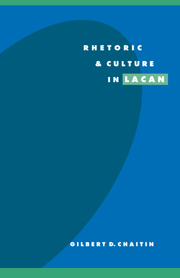Book contents
- Frontmatter
- Contents
- Acknowledgements
- 1 Introduction
- 2 Treeing Lacan, or the Meaning of Metaphor
- 3 A Being of Significance
- 4 From Logic to Ethics: Transference and the Letter
- 5 Desire and Culture: Transference and the Other
- 6 The Subject and the Symbolic Order: Historicity, Mathematics, Poetry
- 7 Conclusion: Lacan and Contemporary Criticism
- Bibliography
- Index
6 - The Subject and the Symbolic Order: Historicity, Mathematics, Poetry
Published online by Cambridge University Press: 04 September 2009
- Frontmatter
- Contents
- Acknowledgements
- 1 Introduction
- 2 Treeing Lacan, or the Meaning of Metaphor
- 3 A Being of Significance
- 4 From Logic to Ethics: Transference and the Letter
- 5 Desire and Culture: Transference and the Other
- 6 The Subject and the Symbolic Order: Historicity, Mathematics, Poetry
- 7 Conclusion: Lacan and Contemporary Criticism
- Bibliography
- Index
Summary
Une langue entre autres n'est rien de plus que l'intégrale des équivoques que son histoire y a laissé persister. C'est la veine dont le réel qu'il n'y a pas de rapport sexuel, y a fait dépôt au cours des âges.
Lacan, ‘L'Etourdit’The textual material toward which the analyst's interpretation is directed is provided by that peculiar form of discourse somewhat misleadingly called ‘free association’. Lacan repeatedly insisted that this technique is not merely one means among many possibilities for reaching the same end; rather it derives necessarily from the very structure of the object of analytic enquiry. There is an ‘absolute coherence’ between the process of free association and the functioning of the unconscious. Negatively, the effect of the basic rule is to free the analysand from the constraints imposed on ordinary discourse by consideration for the addressee (see chapter 5). In the early fifties, Lacan's assumption was that this liberation would somehow permit the subject to complete her understanding of herself by filling in the gaps in her history which have been caused by repression. Underlying this assumption was the notion that the subject is nothing other than a historical process. But even in his latest theories, in which the psychoanalytic subject became that of the cogito, the universal ‘I think’ of the Enlightenment, a certain kind of historicity remained an ineluctable mark of the Lacanian subject. Some 500 years ago Pico della Mirandola declared that ‘man’ is ‘that creature to whom [God] had been able to give nothing proper to himself … a creature of indeterminate nature’.
- Type
- Chapter
- Information
- Rhetoric and Culture in Lacan , pp. 195 - 242Publisher: Cambridge University PressPrint publication year: 1996



